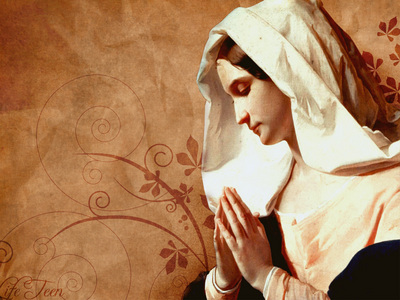
That first word — “Remember…” — gives meaning and hope to one of the most popular prayers of the Church, the Memorare. A deacon friend today asked me to whisper one for him. That sparked quite a few remembrances of my own.
My father used to pray it, incessantly, in his wheelchair at the nursing home after he’d suffered a stroke, his one good hand fingering his beads. And to this day, it’s one prayer my wife and I share together every night.
You probably know it:
that never was it known that anyone who fled to Thy protection,
implored Thy help
or sought Thy intercession,
was left unaided.
Inspired by this confidence,
I fly unto Thee, O Virgin of Virgins, my Mother;
to Thee do I come,
before thee I kneel,
sinful and sorrowful.
O Mother of the Word Incarnate,
despise not my petitions,
but in Thy clemency, hear and answer me.
Amen.
What you may not know is the surprising history behind this prayer, which was popularized in the 15th century by Fr. Claude Bernard (not Bernard of Clairvaux, as many believe). Fr. Bernard evidently learned it from his own father:
Fr. Claude Bernard, known as the “Poor Priest”, zealously dedicated himself to the preaching and aiding of prisoners and criminals condemned to death. Trusting his charges to the care and intercession of the Blessed Virgin Mary, Fr. Bernard employed the Memorare extensively in his work of evangelization to great effect. Many a criminal was reconciled to God through his efforts. At one time he had more than 200,000 leaflets printed with the Memorare in various languages so he could distribute the leaflets wherever he felt they would do some good.
Part of the reason Fr. Claude Bernard held the prayer in such high regard was because he himself felt that he had been miraculously cured by its use. In a letter to Queen Anne of Austria, wife of Louis XIII, he wrote that he was deathly ill once. In fear of his life he recited the Memorare and immediately began to get well again. Feeling unworthy of such a miracle, he attributed the cure to some unknown natural cause. Sometime later, Brother Fiacre, a discalced Augustinian, came to call upon Fr. Bernard. The good brother begged Fr. Bernard’s pardon for disturbing him, but he desired to know how Fr. Bernard was getting along. Brother Fiacre then went on to say that the Virgin Mary had appeared to him in a vision, told him of Fr. Bernard’s illness, told him how she had cured Fr. Bernard of it, and that he was to assure Fr. Bernard of this fact. Fr. Bernard then goes on to write in his letter that he was ashamed of his ingratitude in attributing the cure to natural causes, and asked for God’s forgiveness in the matter.
You can read much more at the link. In the meantime, please whisper one up for all those in need.

